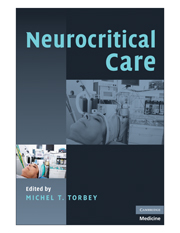Book contents
- Frontmatter
- Contents
- Contributors
- Foreword
- Introduction
- SECTION I PRINCIPLES OF NEUROCRITICAL CARE
- SECTION II NEUROMONITORING
- SECTION III MANAGEMENT OF SPECIFIC DISORDERS IN THE NEUROCRITICAL CARE UNIT
- 10 Ischemic Stroke
- 11 Intracerebral Hemorrhage
- 12 Cerebral Venous Thrombosis
- 13 Subarachnoid Hemorrhage
- 14 Status Epilepticus
- 15 Nerve and Muscle Disorders
- 16 Head Trauma
- 17 Encephalopathy
- 18 Coma and Brain Death
- 19 Neuroterrorism and Drug Overdose
- 20 Central Nervous System Infections
- 21 Spinal Cord Injury
- 22 Postoperative Management in the Neurosurgical Critical Care Unit
- 23 Ethical and Legal Considerations in Neuroscience Critical Care
- SECTION IV MANAGEMENT OF MEDICAL DISORDERS IN THE NEUROCRITICAL CARE UNIT
- Index
- Plate section
23 - Ethical and Legal Considerations in Neuroscience Critical Care
from SECTION III - MANAGEMENT OF SPECIFIC DISORDERS IN THE NEUROCRITICAL CARE UNIT
Published online by Cambridge University Press: 27 April 2010
- Frontmatter
- Contents
- Contributors
- Foreword
- Introduction
- SECTION I PRINCIPLES OF NEUROCRITICAL CARE
- SECTION II NEUROMONITORING
- SECTION III MANAGEMENT OF SPECIFIC DISORDERS IN THE NEUROCRITICAL CARE UNIT
- 10 Ischemic Stroke
- 11 Intracerebral Hemorrhage
- 12 Cerebral Venous Thrombosis
- 13 Subarachnoid Hemorrhage
- 14 Status Epilepticus
- 15 Nerve and Muscle Disorders
- 16 Head Trauma
- 17 Encephalopathy
- 18 Coma and Brain Death
- 19 Neuroterrorism and Drug Overdose
- 20 Central Nervous System Infections
- 21 Spinal Cord Injury
- 22 Postoperative Management in the Neurosurgical Critical Care Unit
- 23 Ethical and Legal Considerations in Neuroscience Critical Care
- SECTION IV MANAGEMENT OF MEDICAL DISORDERS IN THE NEUROCRITICAL CARE UNIT
- Index
- Plate section
Summary
Caring for patients in the neurosciences critical care unit (NCCU) requires consistent and conscientious application of important ethical principles and an understanding of the law concerning surrogate decision making. The vast majority of patients lack decision-making capacity due to coma, aphasia, delirium, or other alterations of consciousness, and therefore decisions regarding their treatment and care must be made by surrogates. In addition, many NCCU patients have uncertain prognoses that will influence the type of treatments offered by the NCCU team, and the types of decisions made by the surrogates.
COMPARISON OF ETHICS AND THE LAW
The terms morality and ethics are often used interchangeably, although some authors make the distinction that morality refers to “norms about right and wrong human conduct” and that ethics refers to ways of understanding or studying morality. More plainly, morality answers the question of what should be done in a particular circumstance, and ethics answers the question why it should be done, or what justifies the action. Bernat provides a practical combination of the two, defining clinical ethics as “the identification of morally correct actions and the resolution of ethical dilemmas in medical decision making through the application of moral concepts and rules to medical situations.”
Identification of morally correct actions can be guided by abstract principles such as autonomy, beneficence, nonmaleficence, and justice; by virtues of the physician; or by various analytical methods such as utilitarianism or deontology. In the end, ethics is about identifying the values relevant to a given situation and deciding how those values might guide our conduct.
- Type
- Chapter
- Information
- Neurocritical Care , pp. 308 - 318Publisher: Cambridge University PressPrint publication year: 2009



